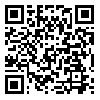Volume 11 -
IJMEHM 2018, 11 - : 388-396 |
Back to browse issues page
Download citation:
BibTeX | RIS | EndNote | Medlars | ProCite | Reference Manager | RefWorks
Send citation to:



BibTeX | RIS | EndNote | Medlars | ProCite | Reference Manager | RefWorks
Send citation to:
Shirazi Sader B, Majd S A, Rafati S, Poshtchaman Z, Rejeh N. The Evaluation of Patients’ Tendency and Their Family to Discloser of Malignant Disease. IJMEHM 2018; 11 :388-396
URL: http://ijme.tums.ac.ir/article-1-5953-en.html
URL: http://ijme.tums.ac.ir/article-1-5953-en.html
Bentolhoda Shirazi Sader1 
 , Siamak Afahin Majd2
, Siamak Afahin Majd2 
 , Shiva Rafati *
, Shiva Rafati * 
 3, Zahra Poshtchaman4
3, Zahra Poshtchaman4 
 , Nahid Rejeh5
, Nahid Rejeh5 


 , Siamak Afahin Majd2
, Siamak Afahin Majd2 
 , Shiva Rafati *
, Shiva Rafati * 
 3, Zahra Poshtchaman4
3, Zahra Poshtchaman4 
 , Nahid Rejeh5
, Nahid Rejeh5 

1- Medical Student, Shahed University, Tehran, Iran.Associate professor, Department of medical ethics, Shahed University, Tehran, Iran
2- Associate Professor of Neurology, Medical Ethics Department, School of Medicine, Shahed University, Tehran, Iran
3- Assistant Professor of Pediatrics, Medical Ethics Department, School of Medicine, Shahed University, Tehran, Iran
4- MSc of Critical Care Nursing, Department of Nursing, Sabzevar University of Medical Sciences, Sabzevar, Iran
5- Professor, Department of Nursing, Shahed University, Tehran, Iran
2- Associate Professor of Neurology, Medical Ethics Department, School of Medicine, Shahed University, Tehran, Iran
3- Assistant Professor of Pediatrics, Medical Ethics Department, School of Medicine, Shahed University, Tehran, Iran
4- MSc of Critical Care Nursing, Department of Nursing, Sabzevar University of Medical Sciences, Sabzevar, Iran
5- Professor, Department of Nursing, Shahed University, Tehran, Iran
Abstract: (4210 Views)
Considering the increasing prevalence of the malignant diseases and their great effects on the different aspects of the patients’ life and even their family, the disclosure of its diagnosis and trust telling to the patients have been changed to one of the main medical ethics challenges. This study aimed for the evaluation of patient’s tendency and their family to disclosure of malignant disease. This study was a cross-sectional research. It has been done with a questionnaire on the 270 people. The sample consisted of three groups: 100 patients without cancer disease, 100 patients’ family members, and 70 patients with cancer disease, who referred to Mustafa Khomeini Hospital. The data were analyzed through SPSS-16 software in this study, 74% of the patients with cancer and 85% of patients without cancer and 50% of patients’ families had tendency to know the diagnosis of malignant disease. In the case of prognosis, 39% of cancer patients and 75% of without cancer patients, were agreed to complete knowledge, and 42% of cancer patients and 22% of without cancer patients, agreed on relative knowledge. Regarding the result of this study and respecting the individuals' rights, it seems better for the patients with malignant disease to be informed of their diagnosis and prognosis by the health care workers. Furthermore, it would be better to implement strategies for improvement of patient-physician relationship through physicians' communication skills with patients.
Type of Study: Research |
Subject:
Medical Ethics
Received: 2017/11/10 | Accepted: 2019/02/27 | Published: 2018/04/15
Received: 2017/11/10 | Accepted: 2019/02/27 | Published: 2018/04/15
| Rights and permissions | |
 |
This work is licensed under a Creative Commons Attribution-NonCommercial 4.0 International License. |



